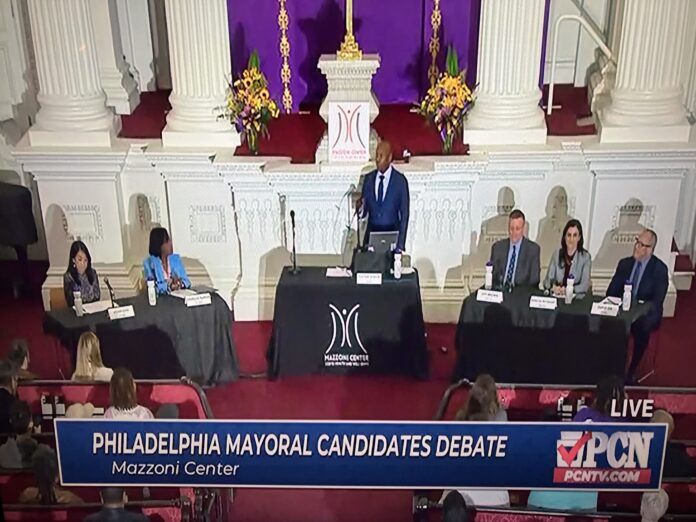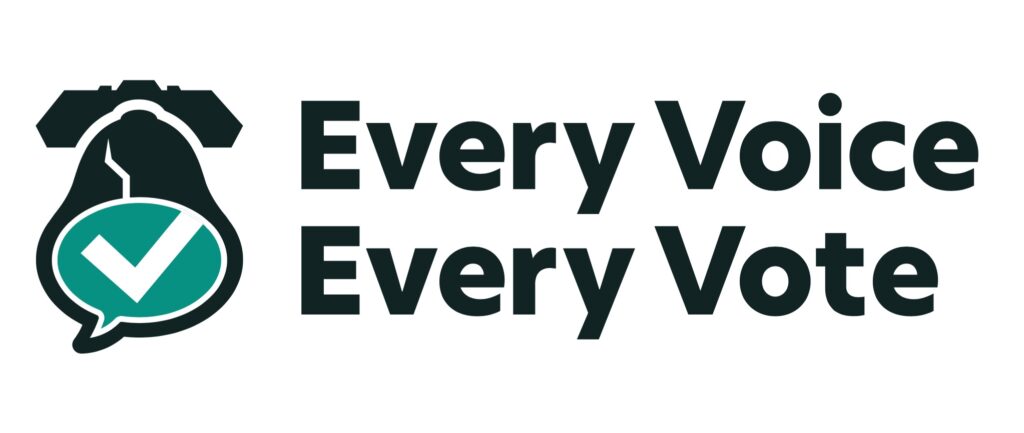
Mazzoni Center hosted a televised debate for Philadelphia mayoral candidates on issues facing LGBTQ+ and other marginalized communities. Democratic candidates Jeff Brown, Helen Gym, Cherelle Parker and Rebecca Rhynhart, as well as Republican candidate David Oh, attended the May 2 forum at the Arch Street Presbyterian Church in Center City.
Staffers from Mazzoni Center and local organizations including Bebashi Transition to Hope, Ark of Safety LGBTQ+ Safe Haven, the Attic Youth Center, Sankofa Healing Studio, and other community members asked questions to the candidates. Sultan Shakir, Mazzoni Center president and executive officer, moderated the debate and inter-question discussion.
Mazzoni Center physician and infectious disease specialist Billie Swiggard started off by asking the candidates how they would create a whole-government approach to addressing healthcare inequities in the LGBTQ community.
Increased cultural competency was at the heart of the candidates’ plans to tackle the issue. Parker emphasized collaborating with local hospitals and medical workers; Brown discussed upping the ante on trainings and working across governmental departments; Rhynhart said she would bolster the Office of LGBT Affairs and hire diverse health department workers; Oh discussed incorporating LGBTQ healthcare professionals into the city’s governance structure; and Gym said she wants Philadelphia to be a “public health first city,” with plans to embed wellness programs and restorative practices throughout the city’s departments.
“I will absolutely make sure that Mazzoni, Bebashi and all the different care agencies around have an opportunity to be a vibrant part of the delivery of that mission,” Gym said at the debate.
Tatyana Woodard, community affairs manager at Mazzoni Center and co-founder of Ark of Safety LGBTQ+ Safe Haven, asked how the candidates would address hate crimes, encourage inclusivity and enhance safety for targeted communities, especially for trans women of color.
Candidates discussed the need for increased cultural competency, to include trans voices in methods of hate crime mitigation and to have trans people of color educate government leaders about the specific threats that they face. Gym brought up the need for a robust accountability system in addressing the issue.
Shakir then asked the candidates whether they had Black trans women working in leadership positions in their offices or organizations. Brown said that he has Black trans women working for his supermarket business, though not in leadership. Gym said she has a Black trans activist working in her City Council office, and the other candidates said that they had LGBTQ representation in their offices and teams, but that did not appear to include Black trans women.
Ava Campbell, youth leadership council member at the Attic Youth Center, asked the candidates about the “debate” regarding appropriate educational content in schools. “Where, if anywhere, would you draw the line when it comes to what is appropriate to teach children in our schools, and who ultimately should be making those decisions,” Campbell asked.
“I don’t think there’s a debate,” Gym responded. “I think there’s a war on LGBTQ, especially trans youth, and families in this country, and it should not be tolerated. It is an absolute war done to weaponize against individuals and politics.”
Most other candidates condemned the censoring of LGBTQ-inclusive curricula and books in schools, though David Oh appeared to be noncommittal on the issue.
“I know what it’s like when people try to prevent you from learning about you, in the hopes that you don’t grow and become more powerful as a result of it,” Parker said. “There’ll be zero tolerance for it in a Parker administration.”
“The hate couched as fear is not acceptable,” Rhynhart said. “I have a 13 year old daughter, I want her to be able to read every book that’s available to her. I want her to be the person who she is no matter who that is.”
Gwen Luxemburg, housing counselor at Mazzoni Center, asked the candidates how they would reduce the rate of homelessness in Philadelphia, “specifically for individuals and families who are Black indigenous persons of color, queer, transgender survivors of sexual assault or disabled?”
Parker said she would create 30,000 units of affordable housing “built by young people in our city, attending our schools, trained by the building trades. We will not be building anything to concentrate poor people in one community. And don’t treat people living in poverty like they’re poor.”
Rhynhart said she plans to increase outreach to people experiencing street homelessness to find out what their specific needs are. She also plans to use the city’s 8,500 vacant properties and lots to create affordable housing.
Gym highlighted the need for a variety of housing options and for investing in programs like Way Home, which pays for a percentage of rent for one year for LGBTQ Philadelphians experiencing homelessness.
Oh suggested building more affordable housing in the neighborhoods that need it, like Kensington, and to reform the Housing Trust Fund.
“We do have to engage with the surrounding counties to get the funds that we need,” Oh said. “We have to provide for them the opportunities — the funding, resources, beds, addiction recovery is available.”
Near the end of the forum, an LGBTQ community member asked how candidates would restore trust in the mayor’s office and commit to address the needs of the LGBTQ community.
Parker said she would create mayor’s community councils in each council district that would include LGBTQ residents and that would liaise with city government on a regular basis, including with police and fire departments.
“We want you interfacing with government on a regular basis,” Parker said.
Brown brought up the fact that the mayor is responsible for a 26,000 person, mostly unionized workforce and that he has demonstrated the ability to manage the city. Brown also argued that serving in City Council does not make a person fully prepared for the job of mayor.
“I would argue that [serving on City Council] is a little useful. But that’s not the job. The job of managing a very large organization, with lots and lots of departments and lots of different unionized workers, is a much different kind of job.”
Rhynhart said that she understands the feelings of distrust in city government and skepticism about its ability to work for people, and after working for the city for nearly a decade, those feelings are what prompted her to run for City Controller in 2017.
“I wanted to make city government truly work for people. I won, it was an upset election in 2017. And as City Controller I have worked every day to take on the status quo, to be transparent, to call Mayor Kenny out, [and] to make our city government truly work.”
Oh said that the LGBTQ community should continue to engage with local elected officials and candidates for office in order to restore trust in city government. He stressed the importance of working with candidates now rather than waiting until after the election is over.
Gym touted her experience working with the LGBTQ community and the various issues that have been highlighted during that work, including youth homelessness and non police mental mobile health crisis units. She also said that her administration would make sure that the LGBTQ community is at the center of its work in improving the city.
“I am not somebody who’s going to talk about a mayor who’s going to shoehorn the LGBTQ plus community into an agenda or into a series of things,” Gym said. “I’m somebody who’s going to put us at the center, because I’ve always seen how communities can lead from the ground up and lead a transformational vision that ends harm and oppression in the city of Philadelphia and doesn’t just manage it.”
The primary election in Philadelphia is May 16.
